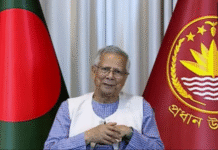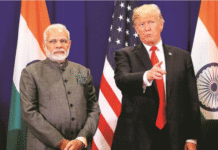Editor-in-chief Toufique Imrose Khalidi on the campaign trail ahead of the May 7 UK ballot.
On a walkabout in the heart of her East London constituency barely three days before May 7 vote, Rushanara Ali oozes confidence.
A third of the roughly 80,000 electorate are fellow Bangladeshis. And anyone in the know of things knows she is all set to return to ‘the mother of parliament’ for another five years.
Speaking in both English and Sylheti minutes earlier, the Oxford-educated politician gave an articulate speech (Audio) to an audience of some 30 leading members of Bangladeshi community at the Brick Lane mosque.
The community chiefs who followed agreed with “our daughter” and endorsed her plea for voting Labour.
It is important for the party to win, she reasons, “for us to be able to deliver”; winning this seat by a bigger margin won’t do. An elderly man reminds everyone of Bengalis’ traditional loyalty to Labour regardless of their political affiliations back in Bangladesh.
“I hope the next time she comes to this mosque she comes as a minister,” says another.


Ali, daughter of a manual worker and the first of her family to go to university, studied philosophy, politics and economics at St John’s College, Oxford, whose fellow alumni include many of Britain’s political superstars, past and present.
And most of her backers would put their money on the ‘girl from Sylhet’s Bishwanath’ becoming a minister, should Labour’s Ed Milliband secure the key to 10 Downing Street on Friday morning.
In fact, three of their daughters are Labour nominees this year. Of the 11 candidates of Bangladeshi origin, they pin high hopes on these three.
The other two aren’t exactly in the same position as Ali, 40, whose Bethnal Green and Bow constituency is one of the safest Labour seats.
Watchers such as Syed Nahas Pasha of bdnews24.com feel Ali will widen the margin over the 11,574 she achieved in the last election.
Rupa Huq, 43, is fighting to reclaim London’s Ealing Central and Acton seat from the Conservatives and faces a daunting task of overturning a nearly 4,000 majority in 2010.
In constituencies with an electoral population of about 70,000 where roughly 65 percent turn up to vote, these numbers are not small.
But Rupa Huq looks relaxed, just two days to the vote, sipping tea at a local café.
Flanked by a small posse of canvassers, she reasons why the Bangladeshi community ought to vote Labour: the party fights discrimination.
An academic who has served in local government as Deputy Mayor, she is proud of her Bengali roots and asks the bdnews24.com reporter if the interview is in English or Bangla.
Huq studied politics, social sciences and law at Cambridge University, and now teaches sociology, criminology, media and cultural studies. Her doctoral thesis dealt with youth culture, which took her to France for a while as a post-graduate student.


Despite all the accomplishments as author of books on sociology, as a music DJ, a columnist for major UK newspapers, she is often referred to as an elder sibling to a celebrity anchor. Konnie Huq’s work on BBC show Blue Peter made her a household name in the United Kingdom.
The race is much tighter a few miles from Rupa’s west London constituency where another British-Bangladeshi woman is at the centre of a three-way battle.
The diminutive Tulip Siddiq, who turns 33 this September, is much bigger head-turner for British-Bangladeshis as well as those back in the South Asian country.
The connection to Bangladesh’s political royalty has been a double-edged sword for the British politician.
Mother Sheikh Rehana would proudly proclaim that political lineage had nothing to do with “Tulip’s achievements” so far, but the grand-daughter of Bangladesh’s founding father Sheikh Mujibur Rahman has seen some nasty propaganda just because of that.
Britain’s right-wing press has seized the opportunity whenever her aunt Sheikh Hasina’s right-wing opponents in Bangladesh have come up with something silly such as a group photo with Russia’s Vladimir Putin.
Ironically, Britain’s Left, too, have historically sided with the forces with roots in Bangladesh’s political or religious right.
The theoretical basis for such support has often been a misnomer in this country.
One latest example are the statements and other forms of support from such luminaries as former London mayor Ken Livingstone for the Tower Hamlets’ disgraced leader Lutfur Rahman and the right-wing religious elements in the borough.
“Some of these elements work against Labour candidates such as Tulip,” says one Bangladeshi community leader, because they mix up with their objectives back in Bangladesh.
“All her work as a rights activist doesn’t get counted,” the community leader says, “and she is suddenly branded as something she is not even remotely related to.”


Siddiq’s challenges are deeper than the other two “daughters”.
Her Hampstead and Kilburn constituency is home to a difficult mix of multi-millionaires, their multi-million pound mansions and pockets of poor and deprived communities.
As a Cabinet member on Camden Council, she has fought to save local schools and hospitals – the issues affecting the poor, while as a parliamentary candidate her agenda also included calming the nerves of these mansion owners. As part of taxing the rich, her party plans to slap high surcharge on these wealthy home-owners at Hampstead.
Five years ago, candidates in the constituency from the UK’s major political parties were locked in one of the closest electoral races in history. Oscar-winning actress Glenda Jackson (17,332) narrowly beat Conservative candidate (17,290) by just 42 votes. The Lib Dem nominee was just 799 votes behind.
“Tulip Siddiq is no Glenda Jackson,” points out one Labour activist near her campaign headquarters at Kilburn High Road, “but she’s made up for that through hard work.”
“Tulip has probably knocked every door of her constituents personally more than once and maybe twice or thrice. She’s been terrific on the campaign and is full of unbelievable energy.”
Jackson is all praise for her hard work. “She is a dedicated and passionate campaigner,” she told the ‘Times of India’.
Evidently, she has very carefully groomed herself for the role. She went to two of the top UK universities for her degrees in English literature, and then in politics, policy and government.
Her varied experience includes her time on the Barack Obama campaign team in 2008.
Her passionate support for Britain’s National Health Service, she says, comes from the family’s experience with her academic father who has suffered long bouts of illness.
In fact, all three British-Bangladeshi women speak of their resolve to save National Health Service and support the poor communities – the core Labour values – and pledge to promote causes that help ethnic Bangladeshis in Britain.
But unconditional support from them may not be forthcoming for all.
Ali, for one, angrily dismisses suggestions of divisive politics back in Bangladesh having any likely impact on the vote.
The former shadow junior minister for international development refuses to be drawn on the issue while promising that support for Bangladesh would continue from a future Labour government.
For Amin Ali, the celebrated Bangladeshi restaurateur and a life-long Labour supporter, these three seats are “already in the bag”.
“And I am sure we’ll add another three in the next five years,” he says as he affectionately hugs Rupa Huq before heading for Kilburn High Road.
“Happy, if they are all from Labour, but I don’t mind them coming from other parties as long as they are British-Bangladeshis.”
In all, 18 British-Bangladeshis are seeking to become Member of Parliament from different political parties.
Source: Bd news24











Great news.
They sure will be role model for others to come.